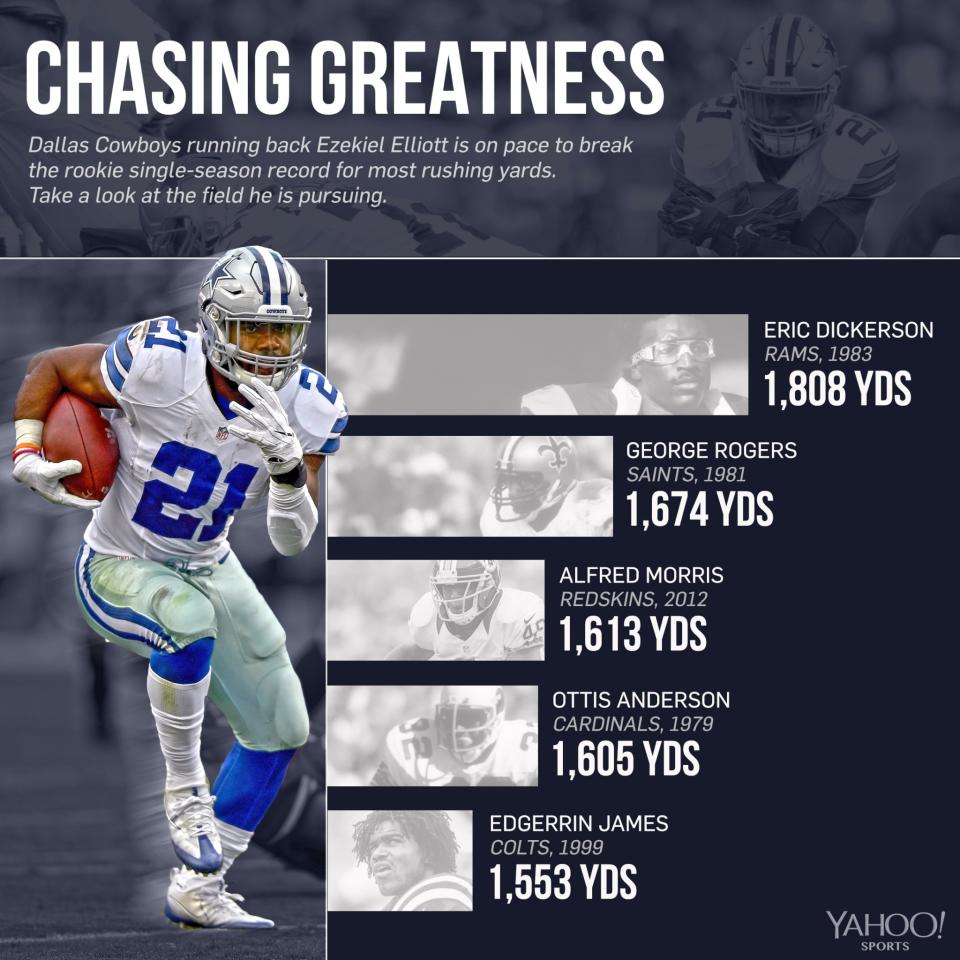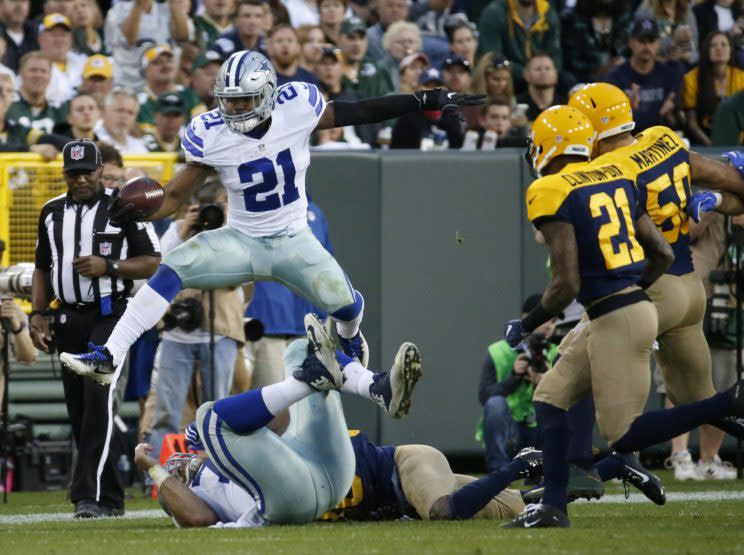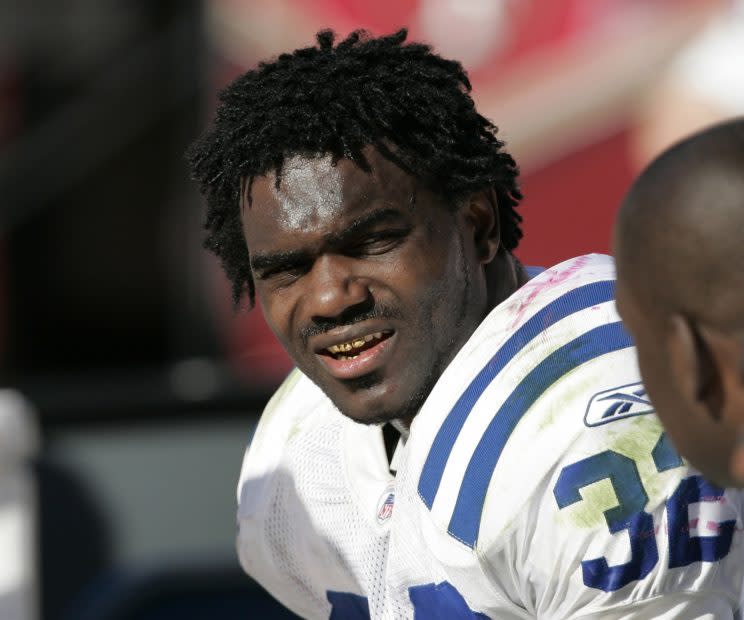Ezekiel Elliott restoring pride for old-school running backs
When Edgerrin James talks about Ezekiel Elliott, there’s a little bit of a campaign slogan inside the assessment. A little reach for what has been lost in an era of rotational running backs and situational specialization. He admits he hasn’t seen all of Elliott’s snaps this season. But he has seen enough to hope Elliott can turn back history a little bit.
Maybe this will be the guy to make running backs great again.
“From what I have seen, he’s with the right team,” James said of the Dallas Cowboys rookie, who remains the NFL’s rushing leader with 703 yards heading into Week 8 despite sitting last week on a bye. “He’s a great player. He’s a great running back. I’m glad you have a player like him who is bringing back the significance of the running back. He has all the tools.”
James isn’t suggesting that running backs aren’t great anymore, mind you. Just pointing out that the Cowboys chose Elliott for a purpose that rarely exists anymore in NFL offenses. He’s the centerpiece. He’s the focal point. Something that won’t change with a healthy Dez Bryant or when Tony Romo starts again. Dallas took Elliott No. 4 overall to make him the engine – to implement him like Emmitt Smith – and that isn’t how NFL teams think anymore.

And James loves that. A Hall of Fame finalist last season, James was known for being an every-phase player. He churned out yardage, finishing his career with 12,246 rushing yards (good for 11th all time upon retirement), 3,364 receiving yards and 91 total touchdowns. He was also one of the best blocking running backs of his era, making him a dominant every-down cog for much of his career. His contemporaries? Guys like LaDainian Tomlinson, Curtis Martin, Jerome Bettis and Marshall Faulk.
So when James thinks about his era in the NFL, he remembers it being a running back league. He also knows his career was likely encapsulated in the end of that epoch, just before league rule changes radically opened up the passing game. But when he looks at Elliott, he sees a guy who would have fit in 10, 20, 30 years ago – when drafting a running back with a top-five pick wasn’t perceived as mismanagement. Or when the phrase “dime a dozen” never wandered too far into the backfield. If Elliott can rekindle that, James says it will be good for NFL offenses that have become slot machines in recent years.
More than anyone, he knows such a change in perception is unlikely. He has noticed fewer young running backs capable of being long-term centerpieces – largely because of scheme and the penchant for specialization. When he looks at Elliott, he sees a guy who could someday be a 15,000-yard back. And for better or worse, he knows those kinds of guys are basically extinct.
“I’m sitting in a position where it’s actually going to be rare to see a running back get 10, 11, 12,000 yards,” James said.
The numbers back that up, too. Frank Gore, Adrian Peterson and Steven Jackson have all eclipsed the 10,000-yard plateau. At 33, Gore’s career is nearing the end. Peterson’s latest knee injury and performance cast doubt about how dominant he’ll ever be again. And Jackson is essentially done.
After that? A handful of players who may have a tough time eclipsing the 10,000-yard mark. Matt Forte (9,062) has a shot, but turns 31 in December. Beyond him, Chris Johnson (9,537) is a 31-year-old bit player. DeAngleo Williams (8,028) is 33 and likely won’t touch the ball enough in the remainder of his career. LeSean McCoy (8,285) should get there, but his chronic hamstring problems are a red flag. Much like the knee problems of Jamaal Charles (7,260). Meanwhile, Jonathan Stewart and DeMarco Murray haven’t even broken 6,000 yards.
Stroll down the active rushing list, and there is a void of young running backs who have managed the consistency that marks the 29 players who have broken the 10,000-yard mark. As James points out, those long-term bell cows have gotten rarer as time has gone on. Todd Gurley looks like he could be one, even with his rough start this season. The other? James points to Elliott, whose style, mentality and purpose all harken back to an earlier time.
He was drafted to be exactly what he has become – a player who carries his team. The fourth overall pick, just like James was in 1999. And he’s getting better as he goes along. Something that James says is the best thing that could be happening in Dallas, because he believes a running back setting a high standard in Year 1 typically translates into long-term dominance.

“It sets the tone for your career,” James said. “The more you play, the game slows down. You’re so young [as a rookie], you’re just having fun and you really don’t understand what you’re doing. You’re just doing what you know how to do [instinctively]. But it sets the tone for your career after that because everyone is gunning for you. There’s no more surprises. To be able to do it again in Year 2, when you know they’re all preparing to stop you, it forces you to realize that you have to train a certain way. It basically forces you to always step your game up from the start because you’ve raised the bar for yourself so quickly.”
But James also knows why some are worrying about Elliott’s workload. After two dominant seasons, James suffered a knee injury in his third year and it took a bite out of his career. Ultimately, he expects Elliott will go as hard and as far as the team lets him go. All of which puts the onus to lengthen his career on Jason Garrett and the Cowboys staff.
“That’s on the coaches,” James said. “The coaching has to tame the player. When you’re a rookie, you love the game, it’s your dream and you finally made it to the NFL. You really don’t want to hold back and you don’t think about the future. You don’t think about down the road. It’s up to the coaches to say ‘Hey, you need to taper back a little bit in practice.’ Coaches have to take care of the player. If the coaches don’t take care of the player, he’ll run himself into the ground just out of the love of the game.”

That’s what Dallas is grappling with now – how much of a workload is too much. While there’s talk about whether Elliott can break Eric Dickerson’s rookie rushing record of 1,808 yards, it’s worth noting all of the rookies (other than Dickerson) who managed over 1,500 yards as rookies – James, George Rogers, Clinton Portis, Ottis Anderson and Alfred Morris – all either suffered significant injuries in their next several seasons or hit a wall in their yards-per-carry production.
As it turns out, this is also what separated long-term running back centerpieces from the guys who faded down the stretch: the ability to stay healthy. To James, that goes hand-in-hand with off-field focus – something that has already become a topic in Elliott’s career. Not getting too lost off the field is one of the things James managed for the better part of his career. He hopes Elliott can find that same line, too.
“Once you start having success in the NFL, it taps into your free time,” James said. “It becomes, ‘Do this, do that.’ If he’s able to maintain [focus], you’ll see a strong career. But once you start having all these outside obligations, it will cut into your training and take you out of your comfort zone. The reason you’re here is because you were able to train and do things a certain way. Once you become an NFL celebrity, everybody wants you to come to this function, come to that function. It really takes away from you. You see that happen with players. That’s the one thing that you hope with [Ezekiel] and some of these other young players – you hope the world doesn’t take him away from what got him there in the first place.”
For now, James sees a rare commodity in Elliott. One that’s good for a game that keeps moving away from James’ era. As much as he’s running for Dallas and himself, Elliott is running for a whole class of elite players who want to see sustained greatness at their position again.
More NFL on Yahoo Sports

